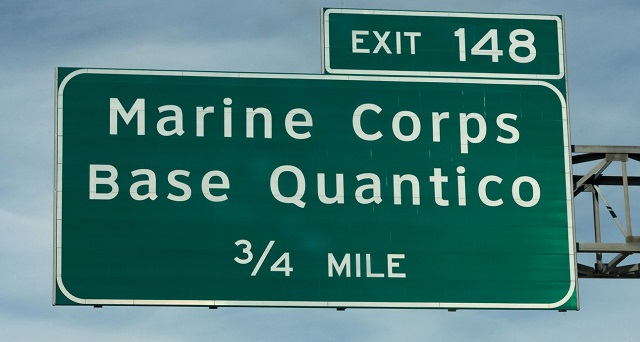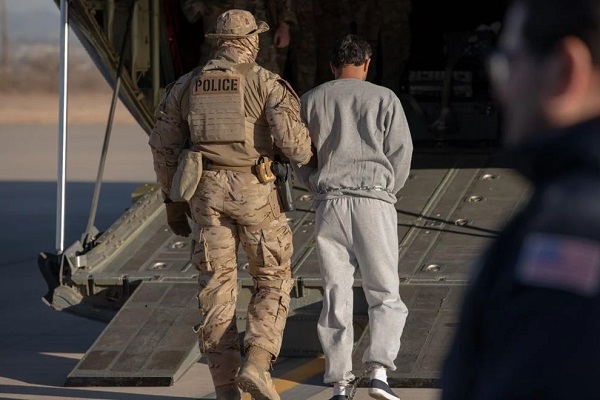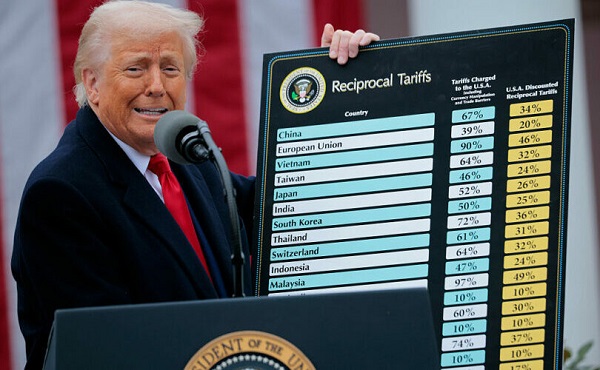illegal immigration
Jordanians in Quantico Truck-Ramming Finally Identified

From the Center for Immigration Studies
By Todd Bensman
Biden/Harris DOJ argued that names of the suspects were protected on grounds of ‘personal privacy’
The Biden administration has refused answer reporters’ questions, rule out terrorism, or even reveal the names of two Jordanians in the country illegally, one of whom had illegally crossed the U.S. Southwest border, who on May 3 conducted a box truck ramming attack on Quantico Marine Corps Base.
The Department of Justice, Department of Defense, U.S. Immigration and Customs Enforcement, and the FBI all circled wagons to guard even the identities of the two Jordanians against five written congressional inquiries, a sixth by Virginia Gov. Glenn Youngkin seeking government briefings about the incident, and most recently a subpoena by the Republican-led House Homeland Security Committee of DHS Secretary Alejandro Mayorkas.
Government lawyers went so far as to refuse a Center for Immigration Studies (CIS) Freedom of Information Act request on grounds that releasing their names was a “clearly unwarranted invasion of personal privacy” and of “minimal public interest” despite the congressional and media inquiries that reached a May 16 White House press briefing where President Biden’s spokesperson refused to answer.
But a systematic search of federal court records by the Center has now turned up the names of the men as Hasan Y. Hamdan and Mohammad K. Dabous. The records also provide an indication of at least what the federal government has done with them since their May 3 arrests, though stop short of why they tried to ram a truck into the military base or how they came to be in Virginia. While one Jordanian illegally crossed the border a month before the incident, the other reportedly overstayed a student visa he’d been issued but never used.

(See the records here: Dabous citation, Dabous criminal information, Hamdan criminal information, Dabous hearing transcript, Hamdan hearing transcript, and Dabous conditions of release.)
Both men stand charged in the U.S. Eastern District of Virginia’s Alexandria courthouse with Class B misdemeanors for allegedly trespassing on a military facility, together on May 3, charges which carry up to six months in prison and a $5,000 fine.
The men “did unlawfully go upon a military installation for a purpose prohibited by law, to wit: knowingly and intentionally entering Marine Corps Base Quantico,” the now-identified charging documents read for both men.
Both men evidently were held by ICE until about the final week of July, when they agreed to certain conditions for their releases – that they show up for all upcoming immigration proceedings and stay away from Quantico or any other military installation, court records show. They are likely free now pending those unknown immigration proceedings and the criminal ones in Alexandria.
The Quantico incident made local headlines that quickly spread in mid-May. Marine sentries arrested both after they pulled up to a main entrance gate in a rented box truck and said they were there to make a delivery as Amazon subcontractors. When they were unable to provide any credentials, guards Instructed to pull over to a secondary inspection area for further questioning.
That was when the driver hit the gas and tried to plow through onto the base despite halt orders, media reports quoting anonymous sources said. Initially, the sources said one of the two Jordanians was on the FBI terrorism watch list, a claim that another anonymous source later disputed in a different media report.
Either way, the men would have succeeded in penetrating into the base interior except that guards deployed vehicle denial barriers.
The administration has gone to extraordinary lengths to avoid characterizing motivations for the incident or do what most interested parties want: rule out the incident as an attempted terror attack by an illegal border-crosser.
A private attorney listed as representing Hasan Hamdan, Dwight Everette Crawley, quickly declined comment to the Center in a phone call. Crawley’s website says he is a former prosecutor-turned criminal defense trial attorney who has represented defendants in capital murder cases.
“I don’t discuss clients. Thanks for your time,” Crawley said, hanging up, when asked if he’d discuss this client.
For reasons not clear, DOJ attorneys – unusually, for such cases – did not file their charges in court for many weeks after the incident became news, not until July 9, in the Eastern District of Virginia in Alexandria. That’s more than two months after the arrests, when media interest had waned.
Because the government refused to release names of the arrested people on supposed privacy grounds and ostensible absence of any public interest, and also delayed filing court papers for more than two months, a systematic search in the Alexandria federal court building did not uncover the public court case records.
On July 22, when both Jordanians showed up for an “initial appearance” before a magistrate judge, ordinarily held quickly to advise arrested people of their rights and to inform them of additional hearings to come, no independent observers were present.
The Center only uncovered the court filings after another records search found them after the open July 22 hearing. The Center did not attend but did order and receive transcripts.
The transcripts showed that both Jordanians appeared in the same courtroom for the same trespass charges, with an Arabic-speaking interpreter, and also that they’d been held in custody since their May 3 arrests.
“I’d like to just point out for the Court’s awareness Mr. Hamdan and Mr. Dabous’s charges for which they’re appearing today stem from the same incident,” a prosecutor told the judge.
But the transcripts also show that, more than 10 weeks after their arrests, federal prosecutors were amenable to support their releases on a promise that they would appear for future hearings.
The judge set both men’s next hearing for 10 a.m. on September 17.
There could many reasons the government might support the release of the suspects. Investigation may have shown they were not considered a threat, or was inconclusive either way; an investigation did find derogatory motivation, but the Justice Department wanted to bury the story by foregoing attention-grabbing terrorism charges in favor of immigration proceedings; or even that the suspects may have become informants whose cooperation authorities would want to reward with a good-faith gesture.
A search of Arabic social media was unable to verify whether either man operated accounts because their names are common in Jordan and in the Palestinian occupied territories near Israel. So, little else could be learned about them.
CIS intern Hadley Ott contributed to research for this report.
COVID-19
5 Stories the Media Buried This Week

 The Vigilant Fox
The Vigilant Fox
“What is likely to happen,” Fauci says, “is the emergence of another respiratory disease.”
“It may be another coronavirus, because we know that coronaviruses, really, mostly in bats, have the capability of binding to receptors that are in humans.”
“It could be another flu,” Fauci continued. “We’re dealing with H5N1 now, which is bird flu, which has taken the somewhat disturbing step of infecting mammals, namely cows and cats and other mammals, which means it’s adapting itself more to a human.”
“So my concern, Walter, is that whenever that happens, the next outbreak will be of a respiratory disease that’s easily transmissible, that has a significant degree of morbidity and mortality,” Fauci said.
When asked if the cuts at HHS and “our attitude towards science” are making the situation “a little bit more dangerous,” Fauci replied, “Oh, absolutely!”
VIDEO: @TheChiefNerd
#4 – Dr. Oz drops bombshells on the massive waste, fraud, and abuse bleeding Medicare and Medicaid.
Oz explained that people are unknowingly signed up for coverage, illegal schemes are funneling taxpayer dollars to those who aren’t eligible, and the same patient can be billed in multiple states with no federal oversight catching it.
It also turns out that 230,000 Americans were enrolled in Obamacare plans without even knowing it.
His reaction at the end of this clip says it all.
VIDEO: @McCulloughFund
While you’re here, don’t forget to subscribe to get this top 10 list emailed to you each week.
#2 – Jenny McCarty reveals chilling encounter after speaking out on vaccine issue.
• After going public about her son’s autism and the vaccine link, Jenny McCarthy received a private visit from a man with a warning.
• He claimed to work for a top-level PR firm and said he was approached by a government agency.
• His job? To create a campaign to discredit her and label her “anti-vaccine.”
• He said he turned down the offer—because his own child had gone through the same thing.
•The man warned her that they would find someone else to do it and use the media to come after her hard.
• McCarthy was stunned and asked him to repeat everything—she said she had chills all over her body.
• When she asked why they’d attack her despite her not being anti-vaccine, he replied, “Doesn’t matter.”
• According to him, they had the media on their side and would do whatever it took to bury her message.
“We gave $13 to $15 billion a year to human traffickers. That’s what this system did,” Antonio Gracias lamented.
Gracias’ team combed through voter rolls in four states and uncovered thousands of non-citizens not only registered to vote, but in many cases, actually voted.
“We looked at the voter rolls in four states, and we found thousands of these people [non-citizens] on the voter rolls, and we found many of those people had voted. In one state in particular, well over a thousand voted.”
His conclusion?
“I think this [Biden’s border policy] was a move to import voters.”
VIDEO: @KanekoaTheGreat
Thanks for reading! This weekly roundup takes time and care to put together—and I do my best to make it your go-to source for the stories that matter most but rarely get the attention they deserve.
If you like my work and want to support me and my family and help keep this page going strong, the most powerful thing you can do is sign up for the email list and become a paid subscriber.
Your monthly subscription goes further than you think. Thank you so much for your support.
illegal immigration
Court attempts to halt Trump deportations, El Salvador president says ‘too late’

From The Center Square
By
A class action lawsuit was filed on Saturday against the Trump administration after President Donald Trump signed an executive order invoking the Enemy Aliens Act to target, arrest and remove violent Venezuelan prison gang members, Tren de Aragua (TdA), from the U.S.
The lawsuit was filed by the American Civil Liberties Union Foundation on behalf of five Venezuelans illegally in the country who were detained in Texas and New York. The lawsuit was filed in U.S. District Court for the District of Columbia.
On Saturday, nearly 300 violent illegal foreign nationals were removed from the U.S. and arrived in El Salvador with the cooperation of El Salvadoran president Nayib Bukele after reaching an agreement with Secretary of State Marco Rubio.
“The first 238 members of the Venezuelan criminal organization, Tren de Aragua, arrived in our country,” Bukele said in a post on X. “They were immediately transferred to CECOT, the Terrorism Confinement Center, for a period of one year (renewable).”
El Salvador also received 23 MS-13 gang members from the U.S. who were wanted by Salvadoran authorities, Bukele said. They include two ringleaders, one of whom “is a member of the criminal organization’s highest structure.” Those sent to El Salvador by the U.S. will help Bukele’s government “finalize intelligence gathering and go after the last remnants of MS-13, including its former and new members, money, weapons, drugs, hideouts, collaborators and sponsors.
“As always, we continue advancing in the fight against organized crime. But this time, we are also helping our allies, making our prison system self-sustainable, and obtaining vital intelligence to make our country an even safer place. All in a single action. May God bless El Salvador, and may God bless the United States,” he said.
The U.S. government is paying a small fee to detain them, Bukele said, and the prison is also making money because it requires inmates to work. These additional inmates, “combined with the production already being generated by more than 40,000 inmates engaged in various workshops and labor under the Zero Idleness program, will help make our prison system self-sustainable,” he said, noting that it costs $200 million a year to maintain.
In response, Rubio thanked Bukele saying, “El Salvador has agreed to hold the violent criminals “in their very good jails at a fair price that will also save our taxpayer dollars. President Nayib Bukele is not only the strongest security leader in our region, he’s also a great friend of the U.S.”
In an emergency hearing held on Saturday, a federal judge ruled that deportations of violent Venezuelans be temporarily halted and those who were illegally in the country and already removed be returned. The ACLU said the order blocked the administration “from deporting anyone under the Alien Enemies Act while the case proceeds. Flights carrying Venezuelan immigrants the DHS attempted to deport have been ordered to turn around and return to the U.S.”
A U.S. federal judge has no jurisdiction over foreign governments.
In response, Bukele posted on X, “Oopsie … Too late,” with a laughing emoji.
Bukele also posted videos and pictures of them arriving in El Salvador in handcuffs. The video shows them being met by El Salvadoran military wearing riot gear and transported in armored vehicles to CECOT. The videos depict El Salvadoran officials lifting up their shirts to show tattoos of gang member affiliation, officials shaving the heads of kneeling inmates and their admittance as CECOT inmates.
Today, the first 238 members of the Venezuelan criminal organization, Tren de Aragua, arrived in our country. They were immediately transferred to CECOT, the Terrorism Confinement Center, for a period of one year (renewable).
The United States will pay a very low fee for them,… pic.twitter.com/tfsi8cgpD6
— Nayib Bukele (@nayibbukele) March 16, 2025
Cooperation between the U.S. and El Salvador expanded under Trump and Rubio, representing a reversal of Biden administration policy that used taxpayer money and planes to transport illegal foreign nationals into the U.S.
Trump has been aggressively targeting of TdA after a record more than 1 million Venezuelans illegally entered the U.S. under the Biden administration, including TdA members expanding operations in at least 22 states, The Center Square first reported.
Under the Trump administration, Venezuelan repatriation flights also began, paid for by the Venezuelan government, negotiated by the Trump administration, The Center Square reported.
-

 2025 Federal Election2 days ago
2025 Federal Election2 days agoWATCH: Massive Crowd for Historic Edmonton Poilievre Rally
-

 2025 Federal Election18 hours ago
2025 Federal Election18 hours agoConservative Party urges investigation into Carney plan to spend $1 billion on heat pumps
-

 2025 Federal Election2 days ago
2025 Federal Election2 days agoAn In-Depth Campaign Trail “Interview” With Pierre Poilievre
-

 2025 Federal Election2 days ago
2025 Federal Election2 days agoHarper Endorses Poilievre at Historic Edmonton Rally: “This Crisis Was Made in Canada”
-

 Business2 days ago
Business2 days agoTrump’s tariff plan replaces free trade with balanced trade. Globalists hate that.
-

 2025 Federal Election18 hours ago
2025 Federal Election18 hours agoFifty Shades of Mark Carney
-

 2025 Federal Election2 days ago
2025 Federal Election2 days agoDon’t double-down on net zero again
-

 2025 Federal Election18 hours ago
2025 Federal Election18 hours agoCorporate Media Isn’t Reporting on Foreign Interference—It’s Covering for It











